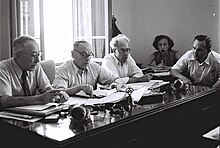 | |
 | |
| Agency overview | |
|---|---|
| Formed | 1969; 56 years ago (1969) |
| Jurisdiction | Israel |
| Status | Independent regulatory agency |
| Headquarters | Jerusalem, Israel |
| Agency executives |
|
| Key document | |
| Website | www |
The Israeli Central Elections Committee (Hebrew: ועדת הבחירות המרכזית, Va'adet HaBehirot HaMerkazit) is the body charged under the Knesset Elections Law of 1969 to carry out the elections for the upcoming Knesset. The committee is composed of Knesset members (and delegates) representing various parliamentary groups and is chaired by a Supreme Court Justice (currently Noam Sohlberg). Tasks for the committee include the authorization of party lists running for the Knesset, election financing, and publication and appeals of election results.
History
1985 amendments
In 1985, the Knesset approved a law which, for the first time, allowed the committee to disqualify a party list on the grounds of its ideological platform. The law allowed the committee to bar parties from elections that negate the existence of Israel as a Jewish and democratic state, made incitements to racism, or supported the armed struggle of an enemy state or terrorist organization against the state of Israel. The first provision, dealing with the existence of Israel as a Jewish state, has been the most controversial since it is possible that parties favoring a one-state solution could be banned under it.
1988 party bans
The committee decided to ban the Progressive List for Peace (PLP) and the Kach Party in 1988. The former was banned for allegedly negating the existence of Israel as a Jewish and democratic state; the latter party was banned because of incitements to racism. The Supreme Court of Israel sustained the ban against Kach, but overturned the ban on the PLP reasoning that it was impossible to determine that "the real, central and active purpose is to bring about the elimination of the State of Israel as the state of the Jewish people".
2003 party ban controversy
In 2003, Likud MK Michael Eitan initiated a move to ban the Ta'al Party from participating in that year's Knesset elections. MK Michael Kleiner, the leader of the right-wing Herut Party, initiated a similar move against the Balad Party, arguing that Balad was "a cover-up for illegal activity" and that it "supports terror organizations, identifies with the enemy and acts against Israel as a Jewish and democratic state".
The Central Elections Committee proceeded to vote by a one-vote majority to disqualify Balad and Ta'al lists from the elections. Supreme Court Justice Michael Cheshin, who chaired the committee, voted against the ban, stating that there was insufficient evidence to sustain the claims against the parties and individuals within those parties, but also said that Balad's leader Azmi Bishara's past expressions of support of the militant pro-Iranian Hezbollah in Lebanon had angered him.
The bans were appealed to the Israeli Supreme Court, where the Court unanimously overturned the bans on the Ta'al list and party leader Ahmad Tibi. The Court also overturned the ban on Balad and party leader Azmi Bishara by a 7-4 majority.
2009 party bans
On 12 January 2009 the Committee voted to ban two Arab political parties, Balad and the United Arab List—Ta'al, from participating in the February elections. The vote to ban Balad from the elections passed 26–3 with one abstention; that to disqualify UAL—Ta'al passed 21–3 with eight abstentions.
The measure was proposed by the Yisrael Beiteinu party, the leader of which, Avigdor Liberman, accused Ahmad Tibi of being part of a fifth column. Lieberman stated that "The next step is to declare Balad illegal because it's a terror organisation that seeks to hurt Israel."
Jamal Zahalka, chairman of Balad, warned that the decision would lead to a deeper crisis between Israel's Jewish and Arab citizens.
On 21 January 2009, the Supreme Court overturned the ban.
Previous chairs
| Knesset | Chair |
|---|---|
| 26 | Noam Sohlberg |
| 25 | Yitzchak Amit |
| 24 | Uzi Fogelman |
| 23 | Neal Hendel |
| 22 | Hanan Melcer |
| 21 | Hanan Melcer |
| 20 | Salim Joubran |
| 19 | Ayala Procaccia, Miriam Naor, Elyakim Rubinstein |
| 18 | Eliezer Rivlin |
| 17 | Dalia Dorner, Jacob Turkel, Dorit Beinisch |
| 16 | Mishael Cheshin |
| 15 | Eliyahu Matza |
| 14 | Theodor Or |
| 13 | Avraham Chalima |
| 12 | Miriam Ben-Porat, Eliezer Goldberg |
| 11 | Yitzhak Kahan, Meir Shamgar, Gabriel Bach |
| 10 | Moshe Etzioni |
| 9 | Eliyahu Moshe Mani |
| 8 | Haim Cohn |
| 7 | Alfred Witkon |
| 6 | Moshe Landau |
| 5 | Zvi Berenson |
| 4 | Yoel Zussman |
| 3 | Shimon Agranat |
| 2 | Yitzhak Olshan |
| 1 | Menachem Dunkelblum [he] |
References
- "The Central Elections Committee". Knesset website.
- ^ "Entry barriers to the Knesset race". Haaretz. 13 May 2002.
- "Right-wing MKs launch bid to disqualify Arab parties". Haaretz. 14 November 2002.
- "Election Committee disqualifies MK Bishara and Balad list". Haaretz. 1 January 2003.
- "Poll ban on Arab Israelis lifted". BBC News. 9 January 2003.
- "Israel disqualifies Arab parties". BBC News. 12 January 2009. Retrieved 16 February 2009.
- "Israel poll ban for Arab parties". Al Jazeera. 13 January 2009. Retrieved 16 February 2009.
- Paz, Shelly (12 January 2009). "Elections C'tee bans UAL, Balad lists". The Jerusalem Post. Retrieved 16 February 2009.
- "Supreme Court revokes ban on Arab parties from national elections". Haaretz. 21 January 2009. Archived from the original on 27 February 2009. Retrieved 16 February 2009.
